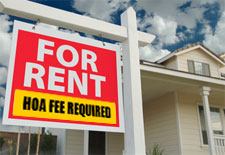*Asked & Answered
Articles Posted in Rules & Regulations
Shining Some Light on Architectural Review of Solar Energy Systems
*New Case Law
More and more homeowners are seeking to utilize the cost-savings and environmental benefits that solar energy systems provide. However, the way in which a homeowner may obtain cheaper and “greener” energy should be balanced against the need for a Homeowners Association (“HOA”) to ensure that such systems will not place additional strain on the Association’s maintenance resources or jeopardize the aesthetic harmony of the community. Civil Code Section 714, a component of the “California Solar Rights Act,” purports to provide for such a balance by imposing additional requirements on an HOA when it evaluates a homeowner application for a solar energy system.
The interpretation of these requirements was central to the ruling in the recent case of Tesoro del Valle Master Homeowners Association v. Griffen. In Tesoro, defendants sought to install a solar energy system at their residence (“the Property”) located within the Tesoro del Valle Master Homeowners Association (“Association”). The dispute arose after the defendants proceeded with installing the solar energy system without the Association’s approval. As is the case with many HOAs, the Association’s CC&Rs prohibited homeowners from performing any “construction, alteration, or removal of any Improvement in the [Association]…without the approval of” the Association’s Architectural Control Committee (“ACC”).
The ruling in Tesoro dealt with many factual and procedural issues regarding the process by which the defendants’ application for a solar energy system was denied by the ACC. However, the most interesting aspects of the holding relate to the court’s interpretation of three issues concerning a HOA’s legal obligations under Section 714 when evaluating an application for the installation of a solar energy system. In general, these issues were:
- What factors can establish that, within the meaning of Section 714, a HOA’s CC&Rs and design guidelines allow for an “alternative solar energy system” of “comparable costs and efficiency” that “does not increase the cost or decrease the efficiency” of the proposed system?
- May a HOA consider the aesthetic impact of a proposed solar energy system in determining whether to approve the application?, and
- If a HOA rejects an application for a solar energy system by requesting that the applicant explore a possible alternative solar energy system, is the HOA responsible for designing or proposing such a system?
Imposing Fees on HOA Members who Rent out their Homes?
 The additional burdens that renters impose can be substantial for many common interest developments–especially those developments designed as “recreational communities.” Renters who lack a sense of investment in the community or who are unfamiliar with its operational structure can place greater strain on the community’s management and maintenance resources. This may not only frustrate other owners within the community, but may also significantly impact the financial health of the Homeowners Association (“HOA”) formed to preserve and protect it.
The additional burdens that renters impose can be substantial for many common interest developments–especially those developments designed as “recreational communities.” Renters who lack a sense of investment in the community or who are unfamiliar with its operational structure can place greater strain on the community’s management and maintenance resources. This may not only frustrate other owners within the community, but may also significantly impact the financial health of the Homeowners Association (“HOA”) formed to preserve and protect it.
We have written about how HOAs adopt and enforce rental restrictions as a means to alleviate some of the problems posed by renters. We have also published a resource explaining how new legislation taking effect January 1, 2012 will limit a HOA’s ability to restrict rentals in certain circumstances. However, in addition to imposing rental restrictions where possible, can a HOA impose a fee on owners who wish to rent out their homes? In the recent, unpublished decision of Watts v. Oak Shores Community Association, the answer may be yes.
2012 Legislative & Case Law Update Now Available
Our “2012 Legislative & Case Law Update” newsletter is now available in our library!
The 2012 Legislative & Case Law Update provides an overview of the new legislation impacting California Homeowners Associations (“HOAs”) and the community association industry professionals who service them. The new legislation includes, among other things, bills that impose new requirements on Board Member meetings and new limitations on HOAs that wish to restrict rentals in their communities.
The 2012 Legislative & Case Law Update also provides an overview of some important new case law, along with some links to additional resources we have published on the items discussed therein.
Click here to read our 2012 Legislative & Case Law Update
Have questions on any of the new legislation or case law? Click here to send us a question online.
Drifting Tobacco Smoke in the Condominium Environment
*New Resource
The problem of drifting tobacco smoke is an issue faced by many common interest developments, especially condominiums. In response to complaints received by their membership, Community Associations (“Associations”) often wonder what their rights and obligations are under both their governing documents and California law to prevent these situations and to protect residents from unwanted tobacco smoke exposure. This blog post discusses these rights and obligations, while providing some guidance to Associations dealing with smoke migration issues.
We have also published a resource on this issue entitled “Drifting Tobacco Smoke in the Condominium Environment” that is available for download from our library.
Continue Reading ›
Electric Vehicle Charging Stations in Your Community?
 In July of this year, Governor Brown signed Senate Bill 209 (“SB 209”) into law. As a result, beginning January 1, 2012, Section 1353.9 will be added to the California Civil Code to restrict an association’s ability to prohibit the installation of Electric Vehicle (“EV”) charging stations (“Stations”). You may have heard of this new law but, like many of our clients and industry partners, wonder what it means for associations and their members. How will the new law ultimately function? Who pays the cost to run the electricity? Must associations permit the installation of Stations on association property? This post discusses the components and criticisms of SB 209 and in doing so addresses some of the questions which have been raised in the wake of its signing.
In July of this year, Governor Brown signed Senate Bill 209 (“SB 209”) into law. As a result, beginning January 1, 2012, Section 1353.9 will be added to the California Civil Code to restrict an association’s ability to prohibit the installation of Electric Vehicle (“EV”) charging stations (“Stations”). You may have heard of this new law but, like many of our clients and industry partners, wonder what it means for associations and their members. How will the new law ultimately function? Who pays the cost to run the electricity? Must associations permit the installation of Stations on association property? This post discusses the components and criticisms of SB 209 and in doing so addresses some of the questions which have been raised in the wake of its signing.
Imposing Fines for Member Discipline: How Many Notices are Required?
*Asked & Answered
Asked – How many notices do you need to give a unit owner about a rule violation before they are called to a hearing and fined?
Answered – Associations generally must provide their members with “due process” before they are able to impose disciplinary measures, such as fines, for rule violations. This due process requirement is meant to ensure that the Association’s enforcement procedures are both fair and reasonable. Two central elements of due process are (1) providing the accused notice of her alleged violation and (2) providing the accused a reasonable opportunity to be heard and to defend herself. Applebaum v. Board of Directors (1980). Notices and hearings for Association rule violations are in furtherance of the due process requirement.
Before conducting a hearing to determine whether a fine should be imposed, the Board must “notify the member in writing, by either personal delivery or first-class mail, at least 10 days prior to the [hearing].” Cal. Civ. Code Sec. 1363(h). Assuming that your Association’s governing documents do not contain a more stringent notice requirement or that your Association does not have an enforcement policy which states otherwise, this is the only violation notice required before a member may be called to a hearing and fined. This notice, however, must contain all of the information required by Civil Code Section 1363(h) (the date, time, and place of the hearing, the nature of the alleged violation, etc.). Please note that Associations are also required to annually provide their members with notice of the Association’s enforcement procedures, including its schedule of fines. Cal. Civ. Code Sec. 1363(g).
|
Though the Civil Code only requires that one notice of violation be given to a member before they may be called to a hearing and fined, it is a better practice for an Association to provide its members with more advanced notice and a reasonable time period (i.e., 30 days) to voluntarily correct the violation before being called to a hearing. Such a practice helps to (1) secure the cooperation of members and (2) demonstrate that the Association is acting both fairly and reasonably in enforcing its rules and restrictions. |
To submit questions to Tinnelly Law Group, click here.
New Legislation Impacts Homeowners Association Board Meetings
*New Resource
When Senate Bill 563 (“SB 563”) was signed into law this month, the fears of many people within the Community Association industry came true. The new legislation purports to provide better homeowner awareness of the affairs of their respective Associations and the ways in which those affairs are being managed by their elected Boards of Directors. However, many industry professionals and Board members are concerned that the new legislation will restrict a Board’s ability to take the actions required to efficiently address the day-to-day issues that arise within their communities.
SB 563 amends several sections of the California Civil Code–most notably Section 1363.05, known as the “Common Interest Development Open Meeting Act.” The amendments include new restrictions on actions without a meeting and what matters may be considered at a meeting. The amendments also provide new requirements with respect to meetings held in executive session as well as requirements for meetings held electronically or by teleconference.
|
In response to requests made by our clients and industry partners, we have published a new resource on SB 563 which outlines these new restrictions and requirements. The resource, entitled “Senate Bill 563: Boards and their Business”, is available for download from our library. |
Requiring Directors to Sign Ethics Rules
*Asked & Answered
Asked – Upon being elected to serve on our Association’s Board of Directors, our Management company gave me “Ethics Rules” to sign. These rules are not a part of our CC&Rs or our Bylaws. Am I required to sign the rules in order to serve on the Board?
Answered – Generally no. Homeowners Association (“HOA”) governing documents typically include a set of Bylaws that govern the corporate structure of the HOA and the functions and duties of its Board of Directors. It is not uncommon for Bylaws to set certain eligibility requirements for HOA members to serve as Directors. Such eligibility requirements can include, for example, ownership of property within the HOA, being current on one’s monthly assessments and not being in violation of any of the HOA’s rules or restrictions. We encourage our clients to adopt these types of eligibility requirements to help ensure those members elected to serve on the Board set a good example for the rest of the membership.
|
Requesting that Directors subscribe to certain “Ethics Rules” or “Codes of Conduct” is always an option available to a HOA’s Board of Directors. Such rules may help to provide guidance to new Directors who wish to better understand the scope of their responsibilities. However, in order to make subscribing to such rules a requirement to serving on the Board, it must be contained in the HOA’s Bylaws or elsewhere in the HOA’s governing documents. Every situation is different, however, and a definitive answer would require examining your HOA’s governing documents and the procedures used in adopting the Ethics Rules at issue. |
To submit questions to Tinnelly Law Group, click here.
New Legislation Restricts the Ability of HOAs to Adopt & Enforce Rental Restrictions
*New Resource
Homeowners Associations (“HOAs”) have traditionally encountered problems with renters in their communities. Because renters do not have an ownership interest in their units and the HOA, they may feel less invested in the community. This often results in renters failing to (1) comply with the HOA’s CC&Rs and/or (2) properly adhere to the HOA’s rules and regulations. HOAs that have high quantities of renters typically find themselves paying more in enforcement costs compared to those Associations that have smaller renter populations.
Senate Bill 150 (“SB 150”), which takes effect January 1, 2012, will effectively prohibit HOAs from adopting the types of rental restrictions they have utilized in the past. In sum, SB 150 exempts owners in a HOA from any rental restrictions that were not in effect prior to the date the owner bought into the community.
|
We have published a resource on SB 150 that discusses this issue in more detail and provides a recommendation for HOAs that have, or are considering, adopting rental restrictions in their community. The resource, entitled “Senate Bill 150 and the Impact on Rental Restrictions” is available for download in our library. |
 HOA Lawyer Blog
HOA Lawyer Blog

